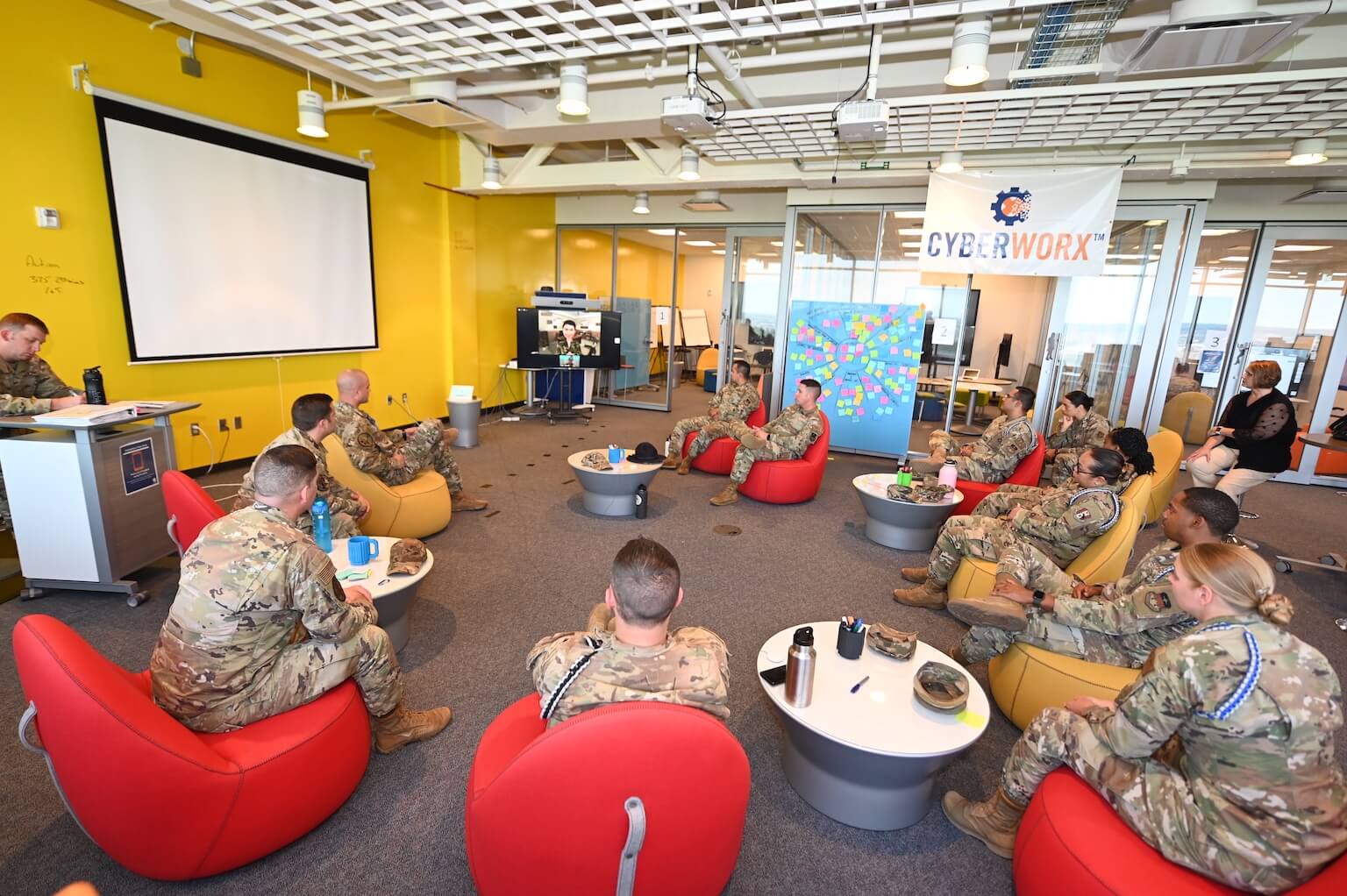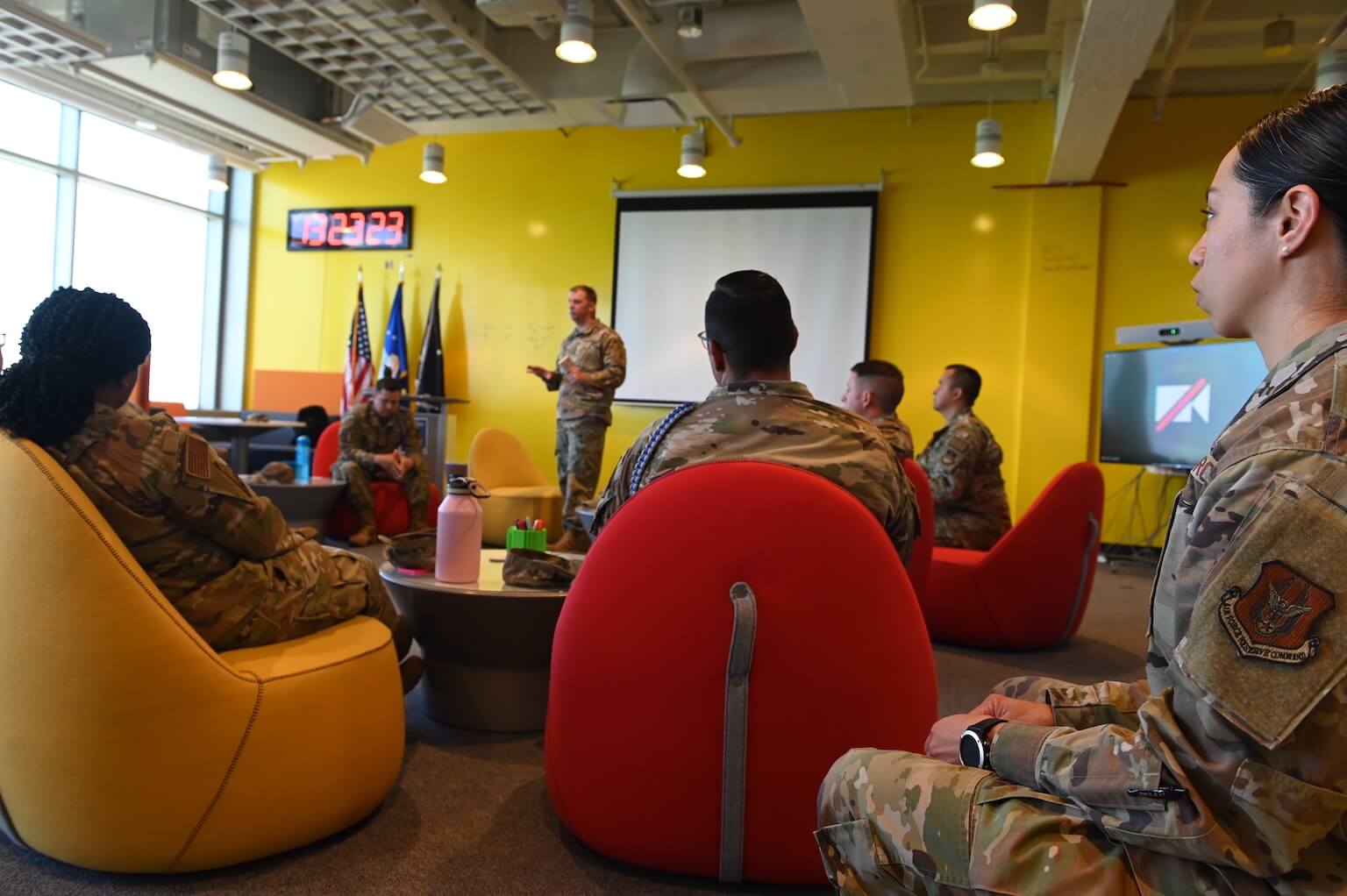Air University ups Academy’s resilience training
 Permanent party personnel attend Master Resilience Training in the CyberWorx conference area at the U.S. Air Force Academy, Colorado 24 Aug. 2022. Course graduates, deemed master resilience trainers, learned classroom management and facilitation skills to teach resiliency to the Class of 2026 starting this fall. (U.S. Air Force Photo/Staff Sgt. Seth Stang)
Permanent party personnel attend Master Resilience Training in the CyberWorx conference area at the U.S. Air Force Academy, Colorado 24 Aug. 2022. Course graduates, deemed master resilience trainers, learned classroom management and facilitation skills to teach resiliency to the Class of 2026 starting this fall. (U.S. Air Force Photo/Staff Sgt. Seth Stang)
By U.S. Air Force Academy Strategic Communications
U.S. AIR FORCE ACADEMY, Colo. – Fifteen Academy permanent party members learned how to facilitate an eight-lesson Air Force Resilience Skills Curriculum (AFRSC) during Master Resilience Training (MRT), Aug. 22 to 26.
Air University provides monthly MRT at Maxwell Air Force Base, Alabama. Due to the high demand for in-house trainers, the Academy held a special training session here. Course graduates, deemed master resilience trainers, learned classroom management and facilitation skills to teach resiliency to the Class of 2026 starting this fall.
“Resilience training consists of positive psychology skills aimed at increasing the wellness of Airmen so they can withstand challenges and function more effectively,” said Lisa Anderson, the Academy community support coordinator. “Resiliency skills are a significant component of the four Comprehensive Airman Fitness domains: mental, physical, social and spiritual. Being fit across each domain leads to a more resilient and ready force.”
Master Sgt. Tyler Darnell, the Master Resilience Training course superintendent, explained the program lessons include building personal gratitude and values-based goals. Participants also learn about bringing their strengths, reframing or controlling how they react, balanced thinking, celebrating the good news, mindfulness and physical resilience.
“Master resilience trainers have the responsibility of delivering these tools and skills to Airmen, key spouses and family members,” explained Darnell. “They work closely with their installation community support coordinator to develop ways to build and enhance resilience skills amongst communities assigned to the installation.”
Newly minted master resilience trainers earned a special experience identifier code allowing them to facilitate the AFRSC at their next duty station.
Cadet Impact
Through resiliency training, cadets learn effective problem solving, adaptability, positive coping, self-regulation and the importance of social support. Cadets will be better equipped to meet the rigors of the Academy and the demands of their future careers as Air Force and Space Force officers.
The resilience training joins a comprehensive set of applied training opportunities at the Academy for cadets to establish and utilize resilience concepts. These are provided by organizations such as the Center for Character and Leadership Development, Peak Performance Center and the Athletic Department. Starting with the Class of 2026, trainers teach freshmen cadets uniform baseline resiliency skills that mirror the training provided to all first-term Airmen.
 Maj. Melissa Garcia-Brown, U.S. Air Force Academy combat survival training officer in charge, attends Master Resilience Training in the Academy CyberWorx conference area at the U.S. Air Force Academy, Colorado 24 Aug. 2022. Course graduates, deemed master resilience trainers, learned classroom management and facilitation skills to teach resiliency to the Class of 2026 starting this fall. (U.S. Air Force Photo/Staff Sgt. Seth Stang)
Maj. Melissa Garcia-Brown, U.S. Air Force Academy combat survival training officer in charge, attends Master Resilience Training in the Academy CyberWorx conference area at the U.S. Air Force Academy, Colorado 24 Aug. 2022. Course graduates, deemed master resilience trainers, learned classroom management and facilitation skills to teach resiliency to the Class of 2026 starting this fall. (U.S. Air Force Photo/Staff Sgt. Seth Stang)
“While master resilience trainers typically instruct the proven skills to new Airmen at the First Term Airmen Center, this group has the skills and knowledge to deliver the resilience curriculum to cadets and the Academy community for the first time,” said Darnell. “This is a step in the right direction. Now Academy military trainers can connect their skills to the Air Force’s newest cadets at the earliest and most impressionable moment of their young Air Force careers.”